Nova Twins interview: “When we record in the studio, we want everything to be played live. Every riff, every sound, it has to be able to be portrayed live”
Amy Love and Georgia South from the London mavericks weigh in on the new Fender Player Plus series

Want all the hottest music and gear news, reviews, deals, features and more, direct to your inbox? Sign up here.
You are now subscribed
Your newsletter sign-up was successful
Guitar Showcase 2021: Every now and then a band comes along to take the electric guitar out of its comfort zone and find new frontiers for the instrument. And the inspiration behind such cultural paradigm shifts needn’t come from outer space.
Nova Twins, the London trio led by Amy Love on guitar/vocals and Georgia South on bass/vocals, with drummer Tim Nugent keeping time, sound like nothing we’ve heard before. But as Love and South explain, the musical inspirations that are driving their dizzying amalgam of rock, punk, hip-hop and RnB are rock’s foundational texts.
It was high-volume allure of Deep Purple, the brash anarchy of the New York Dolls and the righteous anger of MC5 that was establishing a healthy appreciation for volume and chaos. This, allied to growing up on a diet of Toni Braxton and Whitney Houston and looking to Destiny’s Child and Missy Elliot as role models offered them a broader musical canvas.
Why not mix all these elements together? That said, their sound didn’t come easy. It took years playing shows to see what worked before their incendiary debut, Who Are The Girls?, could take shape.
It doesn’t matter your gender or where you are from, or what kind of music you play, Fender seem to cover, like, everything!
Amy Love
Produced by Jim Abbiss, it offers a combustible introduction to a new sound. Love and South consider the contents of their pedalboards precious commercial intel, and is suitably secret. But we can say that their pedalboards have grown since the last time we saw them, pre-lockdown, and now they’ve teamed up with Fender, most recently fronting the campaign launch for its new Player Plus Series.
“Speaking to Fender, they are really accommodating of their clientele, and it is just so great to see so many aspirant young guitarists,” says Love. “It doesn’t matter your gender or where you are from, or what kind of music you play, they seem to cover, like, everything! We felt like this was a good home for us and we want to represent brands that back us, too.”
Here we caught up with Love and South as they basked in the afterglow of sets at Reading and Leeds, and unpack the ethos – and some of the gear – behind their sound.
Want all the hottest music and gear news, reviews, deals, features and more, direct to your inbox? Sign up here.
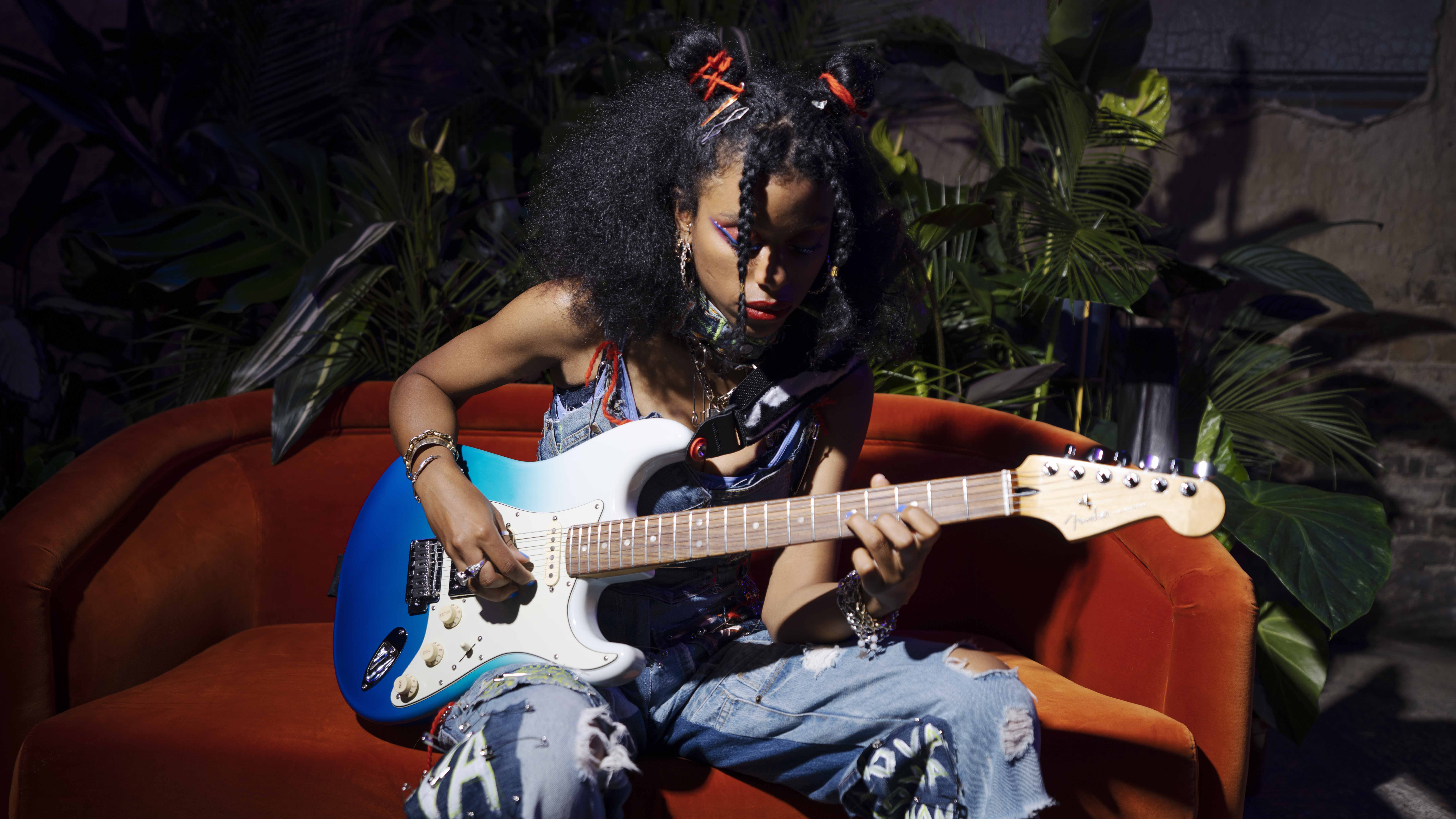
We have spoke before but this is the first time we have had you on the site. For the benefit of those unfamiliar with your sound, how would you describe it? Because there is the culture clash of hip-hop and grime with rock and punk, and you really do play around with sound.
Georgia South: “When we record in the studio, we want everything to be played live. With the first album, that was our manifesto. Every riff, every sound, it has to be able to be portrayed live – so no backing tracks or synths, extra keys, MIDI tracks triggering it all. We want to just do it all, tap-dancing onstage, very manually.
“And for our new music, we are following that same kind of ethos, of using sounds only from our pedalboards and our guitars, just because we want to keep it raw and something different.
“A lot of bands, it’s amazing what they are doing, but we thought it was a cool element to just have the pedals and stick with that for this next album. I’m not saying that we won’t change in the future, but for now we are loving experimenting with pedals, and being in our pedal lab!”
There’s also something really traditional and old-school about how you play this new-school sound.
GS: “Yeah, definitely. The way we approach it is very old-school but we love it. We started off that way, playing tons of punk shows… for years and years and years, just doing it that way as a three-piece, and we just have to…
Amy Love: “Stick to our roots!”
It looks like your pedalboards have got bigger since the last time we saw you. There is something gratifying about that manual process of changing your sound in the moment, it gives you more control over the performance.
GS: “Yeah, it keeps us on the edge of our seats, and just pushes us that much more. It does make life a lot harder and everything is on the edge, and you actually have to hit it on the beat or else it will sound crazy, but it’s just the fun of it.
AL: “Yeah, and I think it is so hard for bands, because a lot of people look at them in terms of pop, RnB, hip-hop being leading genres at the moment – even though rock is making a resurgence again, and is definitely coming back to the forefront and we are definitely excited to see that. But I guess I feel like a lot of people have to keep with that heavy production, heavy tracks-based, to be able to sit on the same bill.
“If you take it back to, I dunno, the '70s or whatever… Obviously, we weren’t around then! [Laughs] But we’ve seen the videos! It’s just the bands playing the music. There is no track happening; it’s just raw, and it is just to the point. It is what it is. I think we feel like, it’s the 21st century, we’re making music, why not try and keep some of those elements and see what we can get out of it, and see how far we can push ourselves?
“And also, without stunting your growth. Obviously, maybe by album four or something we’ll experiment with tracks or something, but I think for now we are just happy to be what we are and that should be good enough.”
How important is volume to your sound? It’s something we don’t talk enough about but it can be so exhilarating.
GS: “Yeah, volume is everything! [Laughs] The other day, we had in-ears for the first time, and the volume wasn’t there. I couldn’t feel the bass, and I couldn’t feel the drums, ‘cos everything was quieter. I am used to having all the sound onstage being super loud. But, it’s obviously better for your ears and your hearing, but it was a harder show because you have got to work harder to be in the music, and when you feel like you are naturally just playing, you’re in that pocket, but when you don’t feel that natural thing, it is a whole different thing.”
AL: “Yeah, and I think live, something we like to play with is dynamics and volume. You can really create a moment by giving the track a bit of space and emptying it out to the point where you can come back and hit it hard for a chorus or something like that. We definitely play with dynamics, with volume, to give the audience more of a journey. And we are writing more music with that in mind. It is important. I think dynamics are key to any band, to be able to take the audience on a journey so it doesn’t get too boring.”
What you want is the audience on a piece of string, and having them hone into what you are doing with those dynamics can be very powerful in a performance. And with you, it’s all about that adrenaline.
AL: “Yeah, that energy is what we love. It’s a lot of the reason why we do it. Because there is nothing like it when you are onstage and everybody in that room – including us in the band – everybody is feeling that one thing, and you’re just having a good time in that moment. Nothing else matters. It doesn’t matter if you’ve got problems in your personal life. When you are just rocking out, having the best time, you are so distracted that it’s therapeutic, and we love that.”
You mentioned new music earlier there. Have you been writing?
GS: “Oh, some new music, yeah.”
AL: “Been working on some bits and bobs.”
Very coy…
AL: “Ha! Kinda vague, but y’know, we are excited nonetheless!”
GS: “Yeah, we have been in the studio. It has been good to get back in the studio after, like, not being anywhere. [Laughs]”
It takes a bit of experimenting for you to find a sound that’s right for a song…
GS: “It was different this time because previously we would write songs and play them live. But you can’t do that in a pandemic, so you are just writing songs and we haven’t actually tested them live. I think it was an interesting way of doing it because you have to think about it in a whole different way, and actually it was a really good way of doing it, just using a different skill set.”
AL: “Sometimes it gets to the point where you can’t remember what you did. When you are writing in the moment, and it’s like Georgia said, we would practise them live but you wouldn’t actually remember. You’d be like, ‘How did we get that sound? How did you create that layer?’ You have to spend a day trying to find it once you get back into the studio.”
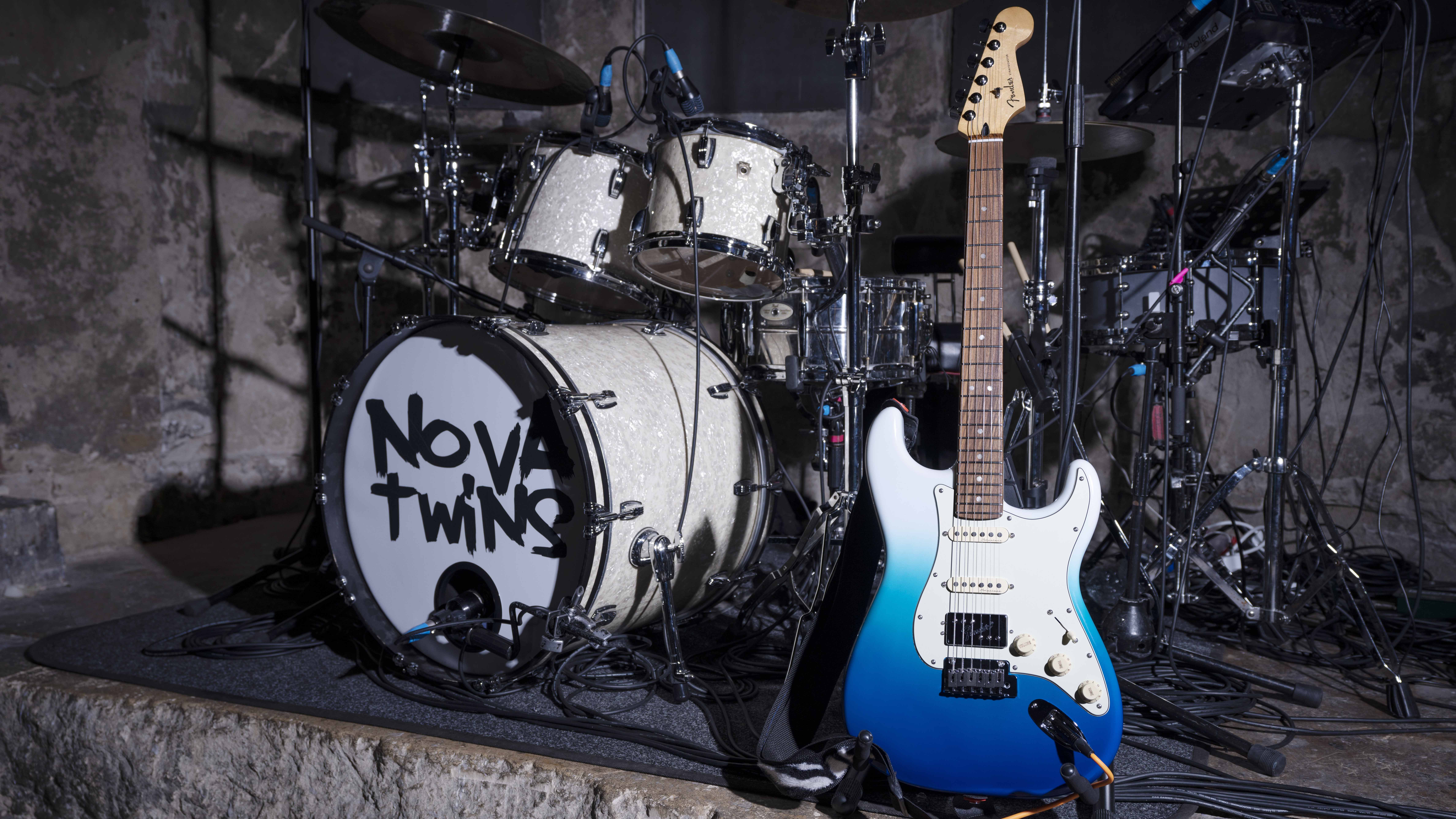
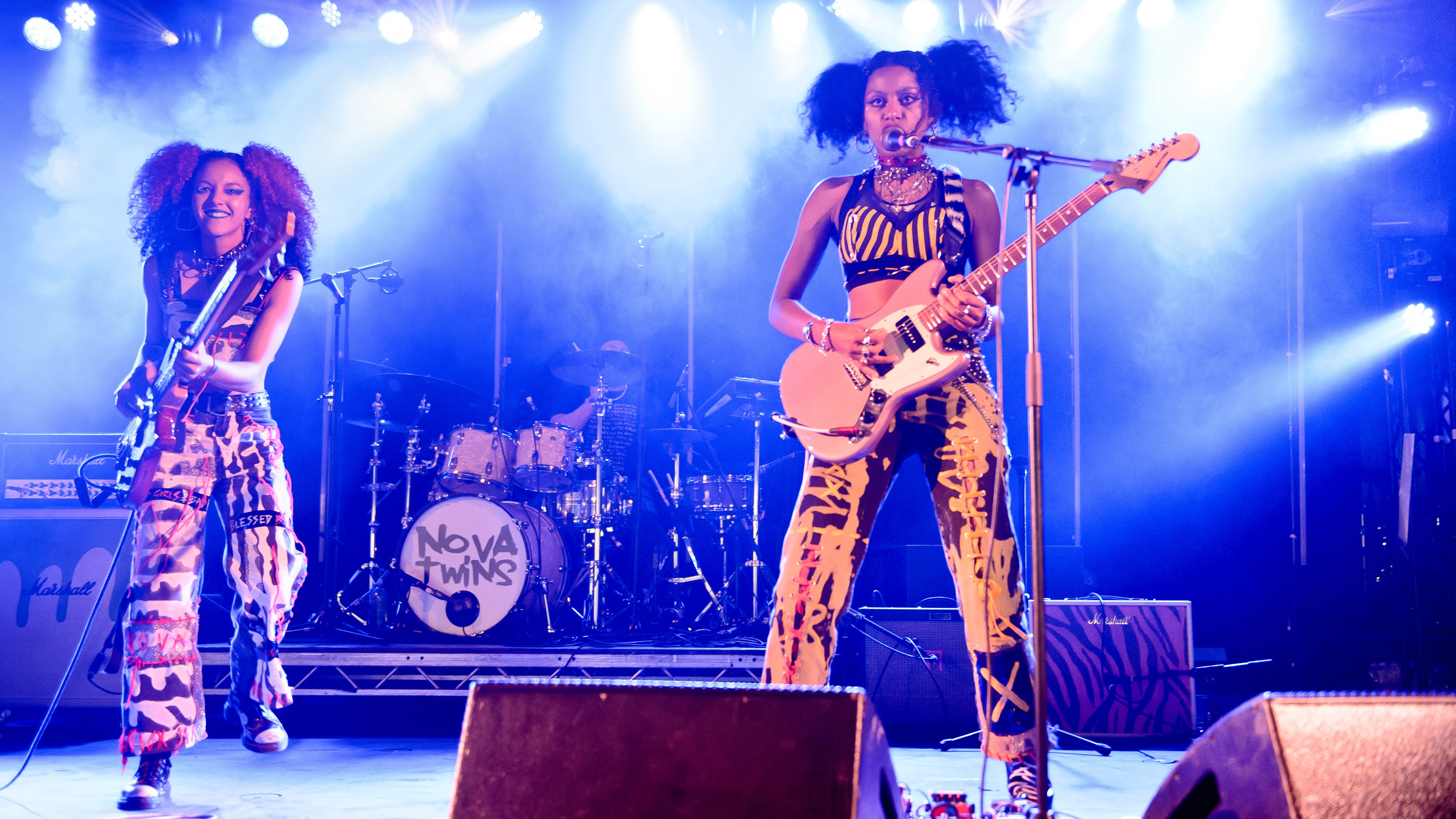
It is about imagination, because you have to imagine the crowd there, and imagine how it is going to be at a festival
Georgia South
It’s like a question of experience. Like what you were saying, Georgia, about in-ears. These things take you out of your comfort zone. Being able to write without the audience’s feedback is a sign of experience. Like you can imagine them but doing so knowing that you have established what works in your sound.
GS: “Exactly, it is about imagination, because you have to imagine the crowd there, and imagine how it is going to be at a festival, and it’s always great using your imagination anyway because it makes everything wider and better.”
You are typically quite secretive about those pedalboards of yours, but can you tell us if you have made any big stompbox discoveries or epiphanies over the last year or so?
GS: “[Laughs] I have! Just new sounds, new sonic ways, like playing two things at the same time; actually, it’s been mind-blowing during the pandemic! [Laughs] Like splitting the sounds more, like high and low but running at the same time if you know what I mean?”
AL: “Very vague!”
Indeed, but what it sounds like you are trying to say without revealing anything is that you’ve been learning some studio production techniques into new ways for you to process your sound live? Thinking of ways to make it bigger without necessarily adding a pedal to the ‘board.
GS: “Yes! Actually, that is exactly what happened. When we write songs, I layer it, like two basses at once, but just record them separately, but now I’ve figured out how to play it live, like for real. And I was like, ‘Woooah! This is great!’ [Laughs]”
You’ve been back on the stage. You just played Reading and Leeds. How did that feel? Because, when you play your first gig, there is always a certain amount of nerves, but was it more difficult to control the emotions after so much time out?
AL: “I think we were anticipating it and we were nervous. In the best way possible. We were excited;. it was excited nerves, I guess, ‘cos it’s such a high-profile gig Reading and Leeds, and it’s got all this history. We always associated with all the big rock bands back in the day so we were like, ‘Okay, we’ve got to come, turn up…’ And we hadn’t even gigged in a year and a half. We hadn’t even done social distancing shows, nothing, but I do think, subliminally, when you take a step back from music and you have more time to soak things up, you do digest a lot and it starts to translate when you perform."
“I feel like, even though we hadn’t been onstage much, I felt our growth [as a band] onstage even though we hadn’t been gigging. And I guess it was all the tech stuff that we had been doing, whether it was the pedalboard growing, or looking at the production a bit more, and just playing because we had more time. I think it goes into everything. It was such a great weekend.”
GS: “Yeah, we had such a great time. It is great to know that we can do all these other bigger shows.”
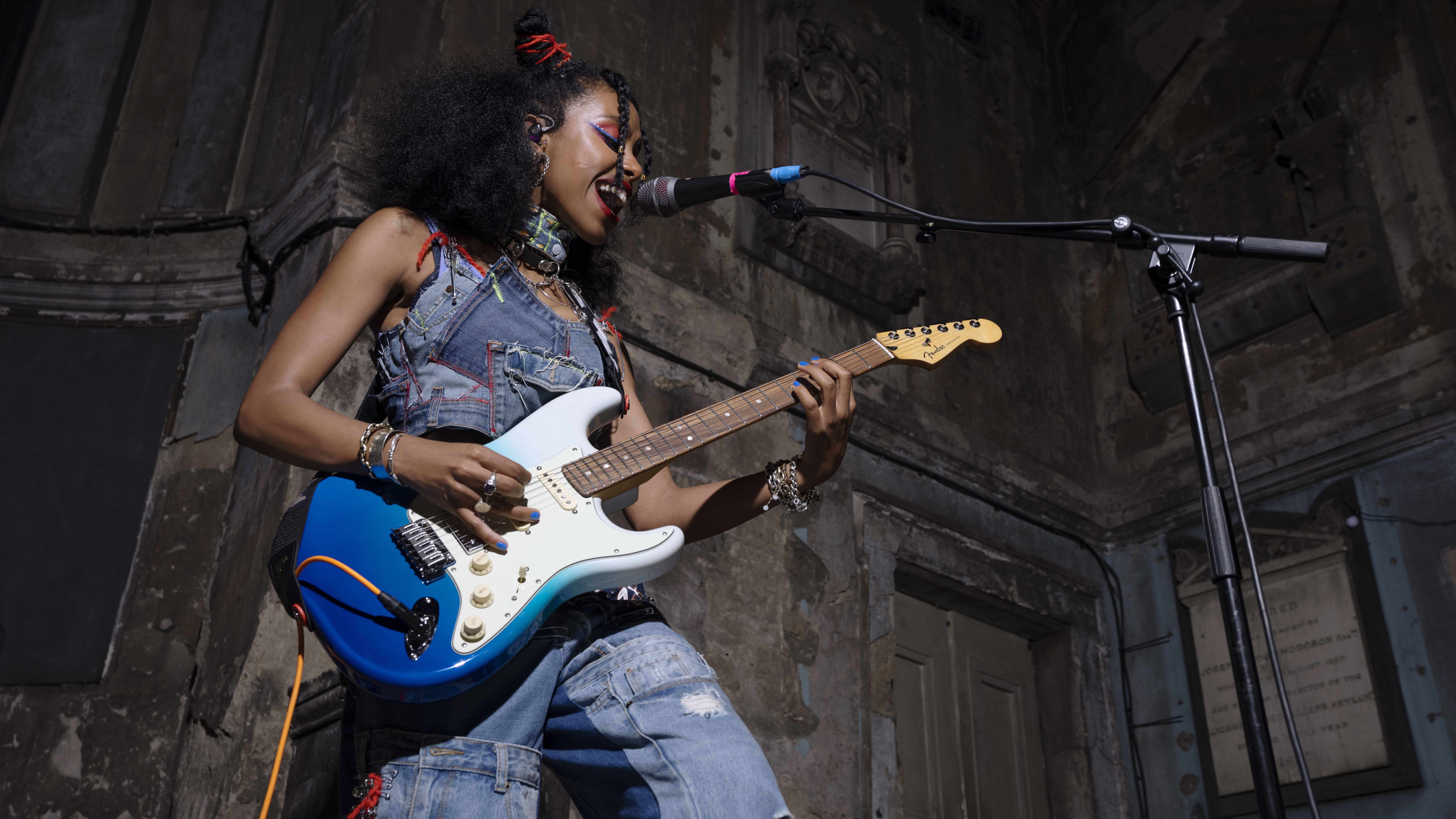
I’ve got a few Fenders and they all work for different songs and for different things
Amy Love
Now you’ve just joined up as Fender artists and having been demoing the new Player Plus Series, but what have you been playing lately? Have you graduated to the Strat, Amy?
AL: “Well, actually, my main guitar is a Player Series Mustang, with P-90 pickups, which really, really work for our sound because they are a little bit beefier – not duller in tone, but it’s not like having a single-coil. Your Strat is a little zingier and has that range which is obviously great for different tracks.
“But I’ve also been introduced to the Player Plus Series Strat. And I’ve obviously got an American Strat as well. I’ve got a few Fenders and they all work for different songs and for different things. They’re just great to play. They really feel solid and comfortable and I like a thin neck. I like the rosewood, yeah, and it’s all great.”
The Mustang is a great guitar because it’s the sort of guitar you can dance with.
AL: “It’s really light and it just fits my curves – especially as a woman, the Mustang is just a perfect shape to fit. Some guitars are bulky and get in the way of your boobs or whatever but the Mustang is perfect.”
On the Player Plus Strat front, it’s the HSS Strat model you’ve been playing, right? And that gives you a few more options.
AL: “Yes, definitely, and that [HSS pickup configuration] is on my Player Plus and my American Professional II. It’s great. You’ve got a lot, a lot of options. It’s really, really cool. I’m excited playing with them and to incorporate them into the set.”
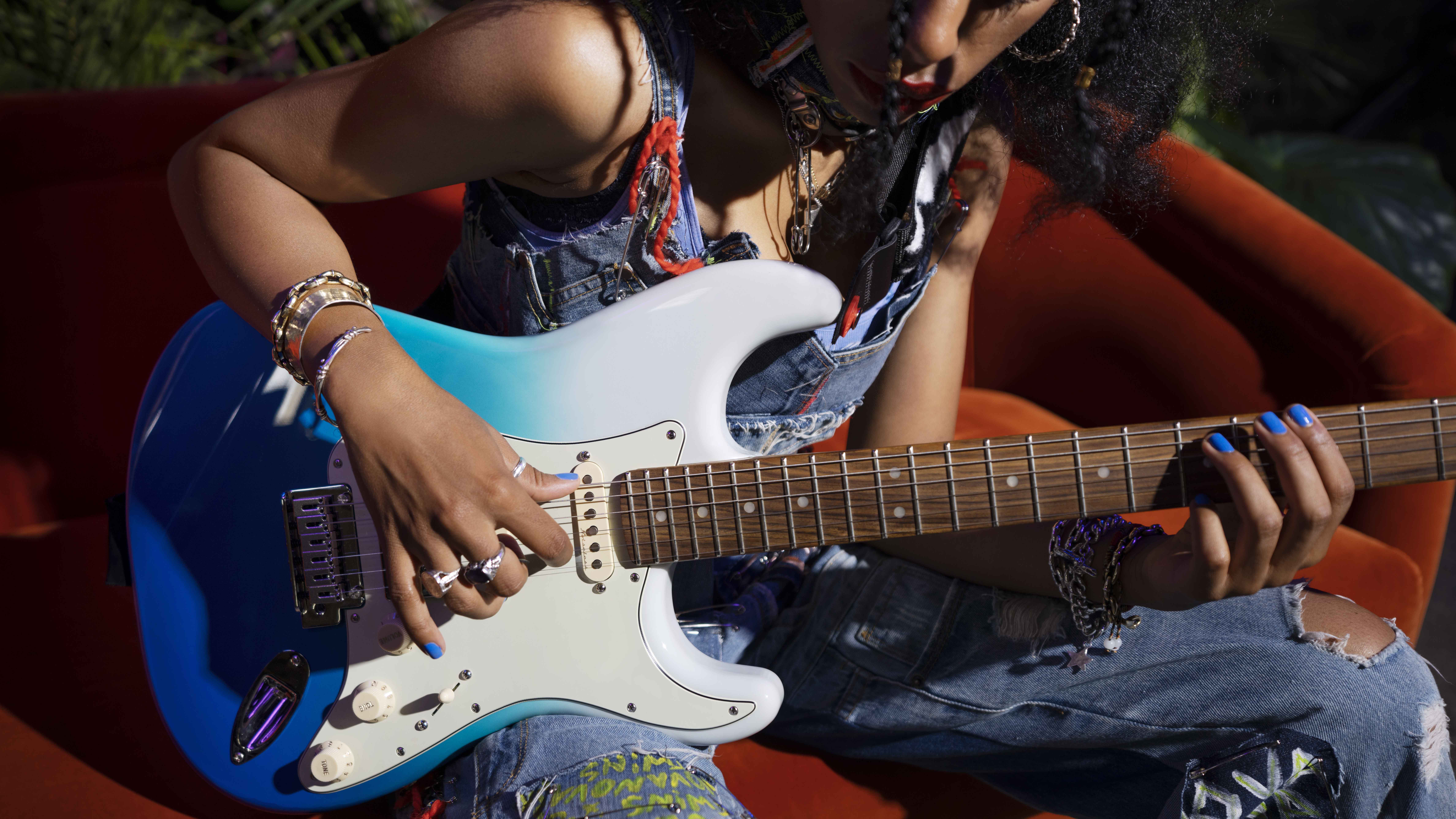
When Fender gave us the fretless people were like, ‘Why? Why did you get a fretless?’ But you’ve just got to use it in a different way
Georgia South
What about you, Georgia?
GS: “Onstage, for a few songs I am using an American Professional II P-Bass, which I love. Because I usually play my Westone Thunder I, which is a passive bass, so the P-Bass was perfect; it reacts the same to my pedalboard. But for songs like Taxi, where it’s all low, it has all this clarity and you can hear all the notes, which I love.
"And it’s a great contrast because the Westone is super heavy. I put the P-Bass on and it’s lightweight and I can just give my back a little bit of a break. But it’s great. I love it. And it is on the majority of the new music as well, just for clarity.”
That’s a consideration we don’t talk about enough, how the guitar works with the pedals. We talk about amps taking pedals well but it’s the same deal for guitar and how the pickups work with it.
GS: “The pickups are the main thing. I don’t tend to use active basses that much. I use it on the passive setting. Sometimes it sounds cool with the glitches but other times the pedals are like, ‘Noooo, I don’t want to!’ [Laughs]”
AL: “I think when we started playing, we always stuck to our one guitar, but you don’t really realise how the guitar reacts almost like a pedal, and like the difference between a DI and an amp, and how that sounds with a P-Bass to a Westone, from a Mustang to a Strat. As you start playing different guitars, you use it as another sonic texture to write with. Because, even your fretless…”
GS: “Yeah, I have a fretless Fender. I got that in lockdown and wrote a verse on that, so it’s cool for the verse to go from all super slinky and then into a different bass for the chorus. I don’t know how I am going to do that live. [Laughs] I’m going to have to try do that on one bass.”
AL: “But I love how you just used it in a different way, because everyone just sees it as a jazz bass, and you use it in a different way, man!”
GS: “Yeah, when Fender gave us the fretless people were like, ‘Why? Why did you get a fretless?’ But you’ve just got to use it in a different way.”
Definitely. And there are possibilities with the fretless. You can use it to emulate a synth.
GS: “Yeah! It sounds super synth-y, it sounds cool.”
Okay, our time is up. One last thing, can you give us any details, dates or anything about a new record? Any chum to throw in the water?
GS: “No. [Laughs] … But we have a [UK] headline tour in February and March.”
Check out the Nova Twins website for dates and for more info on the Fender Player Plus series head to fender.com
Jonathan Horsley has been writing about guitars and guitar culture since 2005, playing them since 1990, and regularly contributes to MusicRadar, Total Guitar and Guitar World. He uses Jazz III nylon picks, 10s during the week, 9s at the weekend, and shamefully still struggles with rhythm figure one of Van Halen’s Panama.
